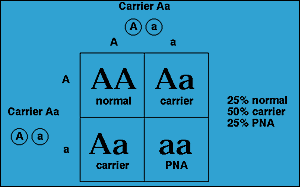1975 USKBTC Position Paper Below are excerpts from the controversial USKBTC 1975 position paper on PNA. The paper might be dated but it is still a major contribution to the genetic cleansing if the breed. To receive a copy of the complete article (copies are free to USKBTC members), write, email, or call: Marie Sostmann PROGRESSIVE NEURONAL ABIOTROPHY Prepared Under the Direction Board of Governors DECEMBER, 1975 PREFACE In response to many requests by members of USKBTC it was decided by the Board of Governors to gather into one paper as much of the data and discussion as practical that might benefit the breeders of Kerry Blue Terriers in eliminating Neuronal Abiotrophy from the breed. On the following pages you will find complete descriptions The Board recognizes that there are other genetic diseases in Kerry Blues which certainly need attention, study and action, but Neuronal Abiotrophy is the first one in which a positive program of relief has the authenticity of an in-depth, scientific research. It is not the intent of the Board to dictate to the membership what has to be done, but rather we do feel it is our responsibility to inform them of all such available information and afford them the opportunity to respond to the needs of the Kerry Blue. INTRODUCTION Most of the work has been accomplished by Dr. Alexander de Lahunta, Professor of Anatomy at Cornell University, with the collaboration and assistance of Dr. F. B. Hutt, Professor Emeritus of Animal Genetics, Cornell. Dr. Damon Averill, Harvard School of Medicine and Boston Children’ s Hospital and Dr. T. A. Holliday, Head of the Division of Medicine at University of California at Davis, have assisted in the study. Afflicted specimens of Kerries were furnished to the Universities by members of the USKBTC from both east and west coasts of United States. Pedigrees of some of the pups that were clinically and pathologically examined are appended and are representative to a sufficient degree of all the specimens examined. These pedigrees provided by the breeders, demonstrate that there is one line common to all. It is the opinion of the Committee that the research projects have been conducted in a scientific and objective manner and are not unfairly prejudiced in any way. There has been no intent by anyone associated with the research project or this report to malign or damage the character or reputation of any person or dog, past or present. This report is respectfully submitted to the Board of Governors (USKBTC) for its serious consideration for general distribution. William Caffey, Chairman PNA Committee SYMPTOMS Because abiotrophy is a progressive disease, the symptoms will become more pronounced. The puppy will fall down only to get right up again and continue to try to get about. By such time the puppy should be diagnosed without doubt. Disposition of the puppy (preferably to one of the recognized veterinary facilities) should be effected at such time as there are no cures nor remissions. Hemograms, urinalyses and cerebrospinal fluid analyses all will be within normal limits. If your veterinarian wishes corroboration for diagnostic purposes, the club will supply him with a reference to the proper source for a more complete description of symptoms and testing procedures. Movie films of diseased puppies are available for loan to chapter clubs or interested groups upon application to the USKBTC.
In order for the club to keep meaningful records of the dissemination of the disease, it is requested that breeders and owners report all suspected instances to the Abiotrophy Committee Chairman, Mr. William Caffey, 3375 Parker Hill Road, Santa Rosa, CA 95404, [Editor’s note: contact the current chairperson of the USKBTC Health & Genetics Committee who will arrange for a clinical examination by a veterinarian qualified to make an accurate diagnosis.) Because of the rarity of the disease, the subtleties of some of its aspects may elude your local veterinarian. |


